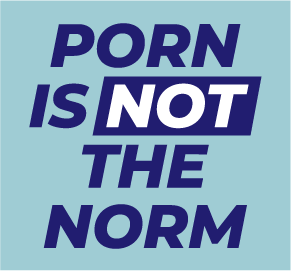Alt-text for the section, ‘What you need to know about porn’ on the Young people page.
What you need to know about porn
Just like any other young person, we, as autistic young people, need access to information and education about pornography and support from the people around us. There are a few key things that we need to know about porn that can help us understand and manage its potential impacts on us:
Porn sex is not safe sex: The sex that is commonly shown in pornography is not safe. Pornography rarely shows people having conversations about consent, or condom use, safety, respect and what a healthy, mutually enjoyable sexual experience might look like.
Porn shares problematic messages: Lots of what is portrayed in porn is not only fake, it communicates dangerous messages. The messages conveyed by pornography can be a source of confusion and concern, and shape unrealistic and unhealthy sexual understandings and expectations. For example, porn can give the impression that everyone wants to have sex all the time. But they donʹt. Porn also suggests that you donʹt need to check in with someone about whether they want to have sex. But making sure a partner is freely consenting to sex – or anything sexual – is vital! Without consent, itʹs sexual assault.
Porn is a performance: In real life, sex is not for a spectator – and itʹs not meant to be just for show. It shouldnʹt be something someone does just for their partner, or just for themselves. For most people, sex is about the whole experience, not just how it looks or about following a script. And it should feel good – physically and emotionally – for everyone involved.
Sex can be so much better than what’s in porn: Sex can be fantastic, but it can also be awful – and everything in between. As autistic young people, we need to understand that if we want to have good sexual experiences, we shouldnʹt learn about sex from porn. The keys to good sex are communication, consent, respect and making sure that sex feels good for everyone involved.
The porn industry makes money by keeping our attention: When porn is free to watch, the industry makes money from collecting viewersʹ data and selling advertising. More people watching more porn means more money for the industry. So, to maximise profits, porn sites are designed to try to keep viewersʹ attention for as long as possible. They do this by learning what kinds of content keep more people watching, then providing a constant supply of more and more of those videos.
The videos may be shocking and show behaviour that is harmful or illegal – because porn sites have learnt that more extreme content captures more attention.
Many of us, as autistic people, can find it difficult to turn away from anything that captures our attention. The sexually explicit nature of the content and the algorithms a porn website uses to work out which videos it will show next can make it particularly difficult for us to turn away from pornography.
Porn is not real: When we see pornography, we may find it difficult to understand whether what weʹre seeing represents reality. Porn is real people having real sex but theyʹre actors – and just like we wouldnʹt mimic what we see actors do in movies, pornography is not something we should watch to learn about how to have sex.
If you’d like to learn more about the impacts of porn, visit our ‘understanding the issues’ page.
Learn more: www.notthenorm.com.au/understanding-the-issues
Image 1: Photo of a man with brown skin putting a condom in the back pocket of a woman's jeans. They're embracing.
Image 2: Close-up photo of two men cuddling and smiling tenderly. One has light brown skin, the other pale skin, and they both have brown beards.
